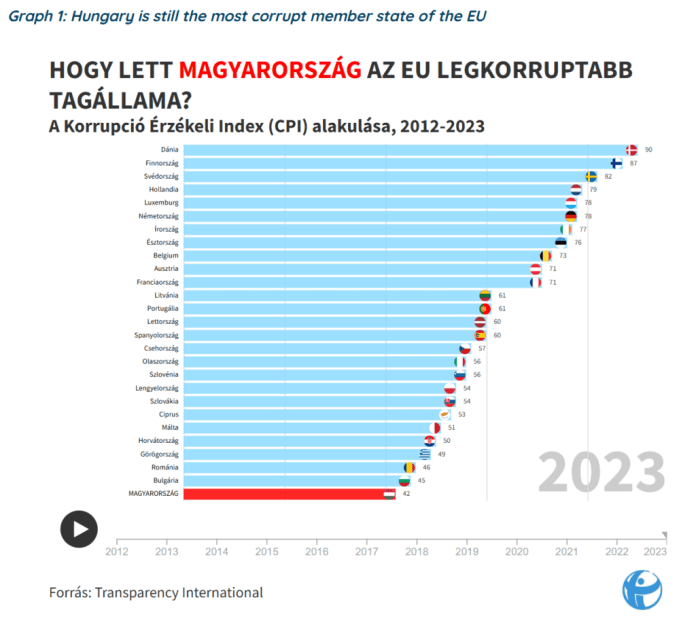Budapest- Hungary remains the most corrupt country in the European Union, according to the Corruption Perceptions Index (CPI) 2023 published last January by Transparency International. Despite some judicial reforms aimed at securing EU funds, systemic corruption continues to undermine Hungary’s governance, raising significant concerns as the country becomes the new Member State presiding over the Council of the EU from 1 July 2024.
Hungary reigns at the bottom of the ranking
Hungary came in at the bottom of the list for the year among EU member states, scoring 42 points on the 100-point Corruption Perceptions Index scale, where 0 represents the highest and 100 the lowest level of perceived corruption. Although the country improved slightly in the global ranking, from 77th to 76th out of 180 countries, this minor improvement does little to counteract the perception and reality of widespread corruption at the national level.

The national report of Transparency International Hungary, published in Budapest, highlights the issue of corruption. Although some reforms have been implemented, they are considered insufficient to restore the rule of law and effectively combat corruption.
Judicial reforms: a drop in the ocean
The Hungarian government has made some changes to its system, due to the influence of the European Union. The EU has linked the allocation of cohesion policy funds to these reforms. In December 2023, €10.2 billion was released by the European Commission as a result of these changes representing the disbursement of EU funds after growing concerns about Hungary’s lack of respect for the rule of law.
However, Transparency International Hungary stressed that these actions fail to ensure autonomy. The authority and capacities of the established Integrity Authority and the Anti-Corruption Working Group are considered insufficient to effectively combat corruption. Government efforts, such as strengthening the protection of trade secrets and imposing barriers to access to public interest data, are seen more as measures than holistic solutions.
Political Motives Behind Transparency International Hungary Review
The investigation by the Sovereignty Protection Office (SPO) into Transparency International Hungary has further complicated the corruption and governance issues in Hungary. Overall, Transparency International has criticised the action as politically motivated to undermine the corruption activities of NGOs. The investigation has raised concerns about the security of information within the NGO, jeopardising its vital anti-corruption work. Hungarian data protection legislation must be aligned with Article 2(1) and Recital (15) of the GDPR in order to ensure the supremacy of European law and regulations within the GDPR. According to the rulings of the European Court of Justice, Member States are required to strictly comply with the provisions of the GDPR, without derogating from this rule.
Economic and regional context
Hungary’s economic situation reflects the challenges it faces in terms of corruption. In terms of GDP per capita, Hungary lags behind its EU neighbours Bulgaria, Croatia and Romania, which are doing better. In comparison, Poland, the Czech Republic and Slovakia demonstrate good performance and efforts in combating corruption.
Although Hungary has a high investment rate, this has not led to economic growth. This suggests that funds may not have been used efficiently due to public procurement activities. Transparency International Hungary points out that despite some improvements, by reducing single tenders, the public procurement system continues to struggle with influence and lacks market competition.
Hungary’s role as President of the EU Council
As Hungary assumes the presidency of the European Commission, these issues become more important. The country’s leadership position raises concerns about how the EU’s various priorities, those concerning the rule of law and the fight against corruption, will be addressed. Scrutiny of Hungary’s actions and their consistency with EU principles is likely to intensify.
Hungary’s persistent corruption problems, as well as its dominant position in the EU, underscore the urgent need for real change and accountability. While there have been some slight improvements in the CPI, these are overshadowed by ongoing struggles against deep-rooted corruption, the lack of judicial autonomy. As Hungary assumes a leading role in the European Commission, global observers will be watching closely to see whether it can effectively address its corruption problems and pave the way for transparency and governance.
The references:
Transparency International. (2024). Transparency International condemns Hungary investigation. AP News. (2024). Hungarian government investigates Transparency International. Transparency International. (2024). Corruption Perceptions Index.
Originally published in The European Times.
source link eu news





















